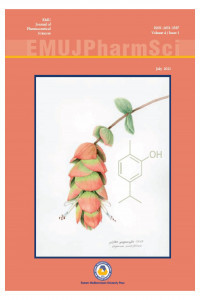Healthy life-style patterns of pharmacists in Turkey
Healthy life-style patterns of pharmacists in Turkey
Healthy Life-StyleBehavior is defined as all the behaviors one engages in to maintain health, including health responsibility, nutrition, exercise, spiritual development, interpersonal relationships, stress management, and protection from disease. Therefore, the aim of this study was to evaluate the life-styles of pharmacists in Turkey. This is a cross-sectional study, with a universe of 24,925 pharmacists in Turkey. While calculating the sample size, expected prevalence was predicted as 50% (often unknown), standard deviation as 5%, confidence interval as 95%, and design effect as 1.0. For the sample size, a randomization table was used with the pharmacists list, and 10% were selected as spare. In total, the life-styles of 398 pharmacists were evaluated, using the “Healthy Life Style Behavior of The Pharmacists in TurkeyQuestionnaire” and the “Healthy Life-Style Behavior Scale.” The highest scores on the Healthy Life-Style Behavior Scalewere on the spirituality subgroup(27.57 + 3.69). This group consists of interpersonal relations (26.29+ 3.61), nutrition (24.58+ 4.39), physical activity (20.34 + 5.23), health responsibility (19.44 + 3.86), and stress management (19.43 + 3.22). New interventional methods, awareness policies, and strategies are required for pharmacists.
Keywords:
Pharmacists healthy life-style, behavior,
___
- Dickey RA, Janick JJ (2001). Life-style modifications in the prevention and treatment of hypertension. Endocrine Practice 7(5): 392-399.
- Ecevit AS, Sabuncu N, Senturan L (2003). Hemşirelik Yüksekokulu. 1. sınıf öğrencilerinin sağlıklı yaşam biçimi davranışları. 2. Uluslararası - 9. Ulusal Hemşirelik Kongresi Bildiri Özet Kitabı. 70.
- Esin MN (1999). Sağlıklı yaşam biçimi davranışları ölçeğinin Türkçeye uyarlanması. Hemşirelik Bülteni 2(45): 87-96.
- Resmi Gazete (2014). Eczacılar ve eczaneler hakkında yönetmelik. http://www.resmigazete.gov.tr/default.aspx. Accessed 03.05.2018.
- T.C. Sağlık Bakanlığı (2006). Türkiye hastalık yükü çalışması. https://www.tuseb.gov.tr/tuhke/yayinlar. Accessed 03.05.2018.
- T.C. Sağlık Bakanlığı (2011). Sağlık istatistikleri yıllığı. https://www.saglik.gov.tr/TR,11651/saglik-arastirmalari-genel-mudurlugu-saglik-istatistikleri-yilligi-2011.html. Accessed 03.05.2018.
- T.C. Sağlık Bakanlığı (2012). Türkiye küresel yetişkin tütün araştırması. http://www.halksagligiens.hacettepe.edu.tr/KYTA_TR.pdf. Accessed 03.05. 2018.
- T.C Sağlık Bakanlığı (2013). Türkiye sağlıklı beslenme ve hareketli hayat programı. http://dosyahsm.saglik.gov.tr/Eklenti/1507,turkiye-saglikli-beslenme-ve-hareketli-hayat-programipdf.pdf?0. Accessed 03.05.2018.
- Satman I, Omer B, Tutuncu Y, Kalaca S, Gedik S, Dinccag N, Karsidag K, Genc S, Telci A, Canbaz B, Turker F, Yilmaz T, Cakir B, Tuomilehto J TURDEP-II Study Group. (2013). Twelve-year trends in the prevalence and risk factors of diabetes and prediabetes in Turkish adults. Eur J Epidemiol 28(2):169-80.
- TEB (2016). Sağlık ilaç ve eczacılık istatistikleri yıllığı. http://teb.org.tr/. Accessed 03.05.2018.
- Türk Hipertansiyon ve Böbrek Hastalıkları Derneği (2012). Türk hipertansiyon prevalansı çalışması. http://www.turkhipertansiyon.org/pdf/Turk_Hipertansiyon_Prevalans_Calismasi_Ozeti-1.pdf. Accessed 03.05.2018.
- TÜİK (2012). Turkey health survey. http://tuik.gov.tr/. Accessed 03.05.2018.
- Türkiye uyuşturucu raporu. EMCCDA 2012 Ulusal raporu (2012). Türkiye uyuşturucu ve uyuşturucu bağımlılığı merkezi. http://www.sck.gov.tr/oecd/2012%20Türkiye%20Uyuşturucu%20Raporu.pdf. Accessed 03.05.2018.
- Özkan S, Yılmaz E (2008). Hastanede çalışan hemşirelerin sağlıklı yaşam biçimi davranışları. Fırat Sağlık Hizmetleri Dergisi 3(7): 90-105.
- WHO (2009). Global health risks: Mortality and burden of disease attributable to selected major risks. Geneva, Switzerland. https://www.who.int/healthinfo/global_burden_disease/GlobalHealthRisks_report_full.pdf. Accessed 16.10.2019. WHO (2019). What is the WHO definition of health? https://www.who.int/about/who-we-are/frequently-asked-questions. Accessed 16.10.2019.
- WHO (2019). The global burden of chronic. https://www.who.int/nutrition/topics/2_background/en/. Accessed 16.10.2019.
- Yalçınkaya M, Özer FG, Karamanoğlu AY (2007). Sağlık çalışanlarında sağlıklı yaşam biçimi davranışlarının değerlendirilmesi. TSK koruyucu hekimlik bülteni 6(6): 409-420.
- Zaybak A, Fadıloğlu Ç (2004).Üniversite öğrencilerinin sağlığı geliştirme davranışı ve bu davranışı etkileyen etmenlerin belirlenmesi. Ege üniversitesi hemşirelik yüksekokulu dergisi 20(1): 77-95.
- ISSN: 2651-3587
- Başlangıç: 2018
- Yayıncı: Doğu Akdeniz Üniversitesi
Sayıdaki Diğer Makaleler
Forced degradation studies of new formulation containing naltrexone
Golnaz YAGHOUBNEZHADZANGANEH, E. Vildan BURGAZ
Plant biodiversity and unique yew stands of Istranca (Yıldız) mountains in European Turkey
Mehtap OZTEKİN, F. Neriman ÖZHATAY
Oleuropein amounts of olive leaves from different regions of Northern Cyprus
Healthy life-style patterns of pharmacists in Turkey
The metabolites of ellagitannin metabolism urolithins display various biological activities
Jale YUZUGULEN, Bahareh NOSHADİ, Karar SHUKUR, Mustafa Fethi SAHİN, Hayrettin Ozan GULCAN
